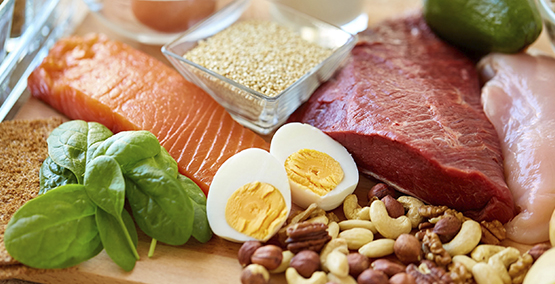
The Latest and greatest treatments for IBD: What to believe
What’s the best IBD medicine for me? Confusion on television and in your inbox....
See moresign up for our newsletter
SubscribeProtein provides the body with amino acids, the building blocks of all the tissues the body needs to rebuild constantly. That's particularly important in inflammatory bowel disease and other issues where protein is turning over quickly.
Fortunately, it's generally easy to get enough protein as a meat eater, and even as a vegetarian or vegan. Here is a list of great protein sources that can be emphasized in your diet:
| Food | Protein (grams) |
| Fish (tuna, salmon, or trout), 3 ounces | 21 |
| Turkey or chicken, 3 ounces | 19 |
| Greek yogurt, 6 ounces | 17 |
| Cottage cheese, ½ cup | 14 |
| Beans, ½ cup | 8 |
| Cow's milk, skim, 1%, 2 % or whole, 1 cup | 8 |
| Pasta, 1 cup cooked | 8 |
| Cheddar cheese, 1 oz | 7 |
| Nuts, ¼ cup | 7 |
| Peanut butter, 2 tablespoons | 7 |
| Egg or egg white, 1 | 6 |

One thing to note is the absence of red meat sources on the list. While red meat can provide a lot of iron (and protein), it is high in saturated fat and best to limit consumption to 1-2 times a month (to get the iron you need). A good substitute for red meats would be beans which are a good source of protein AND iron (not to mention they are much cheaper too!).
Milk is a good source of protein; however, it is also high in saturated fat. The good news is that the amount of protein is the same when you reduce the fat to 1%, 2% or skim milk. If you of your child is lactose intolerant or do not prefer to drink milk, you may drink plant milks instead. It is important to note that some milk alternatives do not have the same protein content. For example, almond milk only has 1 gram of protein in the same 8-ounce cup. The closest substitution for dairy milk would be soy milk in terms of protein and (healthy) fat content.
This article, as well as all others, was reviewed and edited by a member of our Medical Advisory Board.
Subscribe Be the first to know